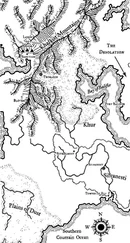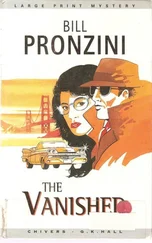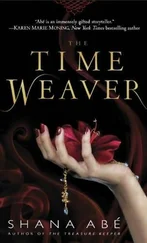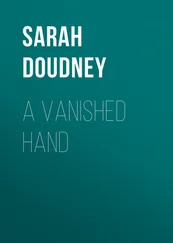‘Ever hear Sam talk about a woman called Ursula Gray?’
Her face remained impassive. ‘Ursula?’
‘Gray.’
Another shake of the head. ‘No, I haven’t heard that name before.’
Normally I could get a handle on people pretty quickly, but Esther Wilson was different. Phlegmatic. Cool. I thanked her and watched her go. When she got to her desk, she opened the top drawer, reached in and took out a packet of cigarettes. I scooped up my notes and walked to the door of the office just in time to hear her tell one of the others that she was heading out for a smoke.
21
Esther Wilson headed out of the big glass doors of One Canada Square. As soon as she was outside, she swung her bag across to her front and started to dig around inside, taking out her mobile. Then she crossed South Colonnade and headed towards Jubilee Park. I was eighty yards back, on the opposite side of the road, where the shade had formed in thin strips around the bases of the towers. Eventually, as she entered the park, the shade disappeared and I had to hang back and watch her cut across the grass and find a bench facing the Citigroup Centre. She was talking to someone on her phone.
The call lasted about three minutes. After she was done, she remained where she was but kept looking back across her shoulder to Heron Quays. She seemed flustered. About five minutes after that, she glanced back again – around fifty feet to the right of where I was standing – and spotted someone, giving them a quick wave. The park and its approach was crowded, so it was difficult to zero in on who it was until another woman broke through, making a beeline for the bench. She looked about the same age as Esther and wasn’t too dissimilar in looks: slim and attractive, a little taller, but not by much. She had blonde hair, scraped back into a ponytail, a red skirt and a white blouse.
The woman perched herself on the bench and Esther immediately launched into conversation. No smile, no greeting. The blonde didn’t seem perturbed, as if she expected it to be like that, which presumably meant she was the woman Esther had called. I moved a little closer, positioning myself against one of the park’s snaking stone walls, and got a clearer view of the other woman. If she’d walked here – if Esther had phoned her out of the blue in the middle of the afternoon – then her work must have been somewhere close by. That was backed up by the fact that she hadn’t brought anything out with her. No bag. No jacket. Esther thumbed open a packet of cigarettes and offered one to the woman.
The conversation went on for a couple of minutes, the other woman eventually taking part. But mostly it was Esther talking. Finally, the blonde reached out, put a hand on Esther’s arm and spoke sternly and seriously to her. When she was done, she stubbed her cigarette out and then – looking at her watch – got up and left.
I followed her, leaving Esther on the bench, back across the park in the direction of the docks. She wasn’t heading for the bridge across to the South Quay, so she had to be heading into one of the buildings running in an L-shape around Bank Street, right in front of us. The routes and grass verges of the park were busy so it became easy to merge with the crowds, but I kept a good distance just in case. On the other side of the park, she moved in a diagonal towards 40 Bank Street, a thirty-three-floor tower towards the corner of Heron Quays. I made up some of the distance between us and, as she entered the foyer, stepped through after her and followed her around, past the front desk, to the elevators. I didn’t look much like I belonged in the world of investment banking, but no one paid me much attention as I waited, just behind the woman, for the lift to arrive. Twenty seconds later, the elevator doors slid open and we both stepped in.
I moved past her to the back. She didn’t even look up. By now she had her phone out and was scrolling through her messages. A couple of others shuffled into the space. One older guy – in a dark, expensively tailored suit – looked me up and down like I’d just crawled out of the sewer, but by the time the doors closed, everyone was facing forward, there was silence, and the space had filled with the choking stench of male aftershave.
The woman was across from me, on the other side of the elevator, half turned, her hip against the side of the lift, her eyes fixed on her phone. Up close, she seemed older – early thirties – but she was still very attractive. There was a hint of Asian in her, in the shape of her eyes, in her nose and chin, but you could only see it if you looked hard.
The elevator pinged, she looked up and, when the doors opened, she moved left and out of sight. This time I let her go. On the wall in front of me was the name of her firm: Michaelhouse Credit.
Back out in the sun, I grabbed my phone, went to the browser and found Michaelhouse Credit on the web. Halfway down, they had a ‘Meet the Team’ page. The woman wasn’t on there. It was just management. I scrolled further down and found a list of partners: other financial firms in Canary Wharf that the company worked alongside.
This’ll have to be my route in .
I dialled the number for the company and waited for it to connect.
‘Michaelhouse Credit.’
‘Oh, hi. My name’s Alex Murphy and I’m calling from Credit Suisse. I just had a meeting with one of your team but she didn’t leave her name or contact details with me.’
‘Oh, I’m sorry, sir,’ the woman said. ‘Shall I put you through to the –’
‘She had blonde hair and was wearing a red skirt.’
‘Oh, that’s Ursula.’
‘Ursula. Right .’
‘Ursula Gray.’
22
Ursula Gray emerged from the elevator into the cool, air-conditioned lobby at 40 Bank Street just after 5.15. I was right across the foyer from her, leaning against the glass front. Three or four men followed her out and they were all looking at her. It wasn’t hard to see why. Not only was she beautiful, but she was immaculately dressed. Her blonde hair hung loose at her shoulders now, not in a ponytail like earlier. As soon as she was out of the lift, she took her phone from her handbag and started checking it.
‘Ursula?’
When she heard her name, she glanced towards me, automatically closing in on herself. It was a natural defensive movement. She didn’t think she knew me, and – even though the foyer of the building was thick with other office workers – she couldn’t be sure what I wanted. I held up a hand to tell her everything was fine and, as I took another step towards her, there was a flicker of recognition in her eyes. We’d never met but Esther would have given her my name and it didn’t take much work in Google to find details of my previous cases and pictures of how I looked.
‘I’m David Raker.’
She chose not to reply initially, but then she seemed to change her mind, as if her silence was some sort of indication of guilt. ‘Do I know you?’
‘Yes,’ I said. ‘You do.’
‘I’m pretty sure I don–’
‘You were with Esther Wilson in the park today.’
A momentary pause. Nothing in her face. ‘I’m sorry?’
‘I know who you are, Ursula. You know who I am. I don’t care what you’ve done, all I care about is Sam Wren.’
No response.
‘I’m trying to find out where he went.’
‘What’s that got to do with me?’
I didn’t bother replying to that: she saw the answer in my face. ‘Why don’t you let me buy you a drink?’
We found a bar on South Colonnade. On the walk over, Ursula didn’t say much. Maybe she was working out a plan. That was the downside with cold-calling people who had something to hide: they automatically felt the need to suppress and create because they hadn’t prepared and were scared about saying the wrong thing.
Читать дальше












